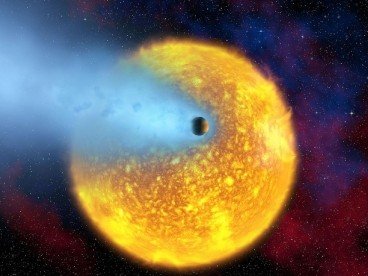Artists's impression of "vanishing" planet. Credit: NASA, European Space Agency, Alfred Vidal-Madjar (Institut d'Astrophysique de Paris, CNRS)
CAMBRIDGE, Mass., May 18 (UPI) -- U.S. scientists say a possible planet 1,500 light-years from Earth is apparently evaporating from the heat of its star, trailing debris like a comet's tail.
The tiny exoplanet, not much larger than Mercury, may completely disintegrate within 100 million years, a blink of an eye in cosmic terms, researchers at the Massachusetts Institute of Technology and NASA said.
The researchers found the dusty planet circles its parent star every 15 hours -- one of the shortest planet orbits ever observed -- and said such a short orbit must be very close to the star, suggesting the planet could be heated to a temperature of about 3,600 degrees Fahrenheit.
Rocky material at the surface of the planet could melt and evaporate at such high temperatures, giving off both gas and dust into space to form the cloud trailing the planet.
"We think this dust is made up of submicron-sized particles," physics Professor Saul Rappaport said Friday in an MIT release.
"It would be like looking through a Los Angeles smog."
Astronomers using the Kepler satellite typically identify exoplanets by looking for regular dips in a star's brightness as a planet crosses in front of it, but in the case of the star dubbed KIC 12557548, they found its light dropped by different intensities every 15 hours.
That suggested something was blocking the star regularly but by varying degrees, they said, and theorized the varying intensities of light were caused by a somewhat amorphous, shape-shifting body.
"I'm not sure how we came to this epiphany," Rappaport said. "But it had to be something that was fundamentally changing. It was not a solid body, but rather, dust coming off the planet."















